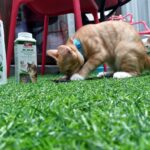Peacock care in Nairobi is an important part of pet ownership, they are spectacular and delightful pets, most suitable for farms and rural surroundings. They are always a sight when the males begin to strut around with their tail feathers extended! Males are commonly called ‘peacocks,’ while females are called ‘peahens.’ Many people simply call both sexes ‘peacocks’ or ‘peafowl.’
Peacocks, known for their striking beauty and majestic appearance, require proper care to thrive in captivity.
Here’s a detailed guide covering basic Peacock care, nutrition, housing, and veterinary care:
- Basic Care:
- Environment: Peacocks need ample space to roam and display their natural behaviors. Ensure their living area is spacious, safe, and secure from predators. They should have access to both shaded areas and sunlight.
- Socialization: Peafowl are social birds and should ideally be kept in small groups. Solitary individuals may become stressed or display abnormal behaviors.
- Handling: Peafowl are generally not fond of being handled. Minimize handling to reduce stress, but ensure regular observation for signs of health issues.
- Grooming: Peafowl may require occasional grooming, such as trimming overgrown feathers or nails. However, be cautious and seek guidance if you’re unsure about grooming techniques.
- Nutrition:
- Diet: Peafowl are omnivores with a diet consisting of grains, seeds, fruits, vegetables, insects, and small animals. A balanced diet is essential for their health.
- Commercial Feed: Quality game bird or poultry feed supplemented with fresh fruits, vegetables, and protein sources like mealworms or crickets is suitable.
- Water: Provide fresh, clean water at all times. Ensure water sources are not too deep to prevent drowning accidents.
- Housing:
- Shelter: Peafowl require shelter from harsh weather conditions, such as extreme heat or cold, rain, and wind. Provide a well-ventilated shelter or coop with adequate insulation.
- Roosting: Peafowl roost at night, preferring elevated perches. Ensure roosts are sturdy and positioned in a safe area within the shelter.
- Space: Peafowl need ample space to roam. Provide a large outdoor enclosure with vegetation for foraging and natural enrichment.
- Security: Ensure the housing and outdoor enclosure are predator-proof, with fencing buried to prevent digging and mesh wire overhead to deter aerial predators.
- Veterinary Care:
- Regular Check-ups: Schedule regular veterinary check-ups to monitor the health of your peafowl.
- Vaccinations: Follow recommended vaccination schedules to prevent common avian diseases.
- Parasite Control: Implement a parasite control program to prevent infestations of internal and external parasites.
- Emergency Care: Be prepared for emergencies by having a plan in place and knowing how to handle common health issues such as injuries or illnesses.
- Behavioral Enrichment:
- Toys and Activities: Provide environmental enrichment such as perches, hanging toys, and foraging opportunities to prevent boredom and encourage natural behaviors.
- Companionship: Peafowl thrive in the company of their own kind. Ensure they have compatible companions for social interaction.
- Breeding Considerations:
- Breeding Season: Peafowl typically breed in the spring and summer months. Provide nesting areas for hens and monitor breeding behavior.
- Incubation: If breeding is desired, consider artificial incubation methods or allow broody hens to incubate eggs naturally.
- Chick Care: Provide appropriate care for chicks, including warmth, protection, and a suitable diet.
By following these guidelines for basic care, nutrition, housing, and veterinary care, you can ensure the health and well-being of your peafowl in captivity. Regular observation and attention to their needs are essential for keeping these beautiful birds thriving.







